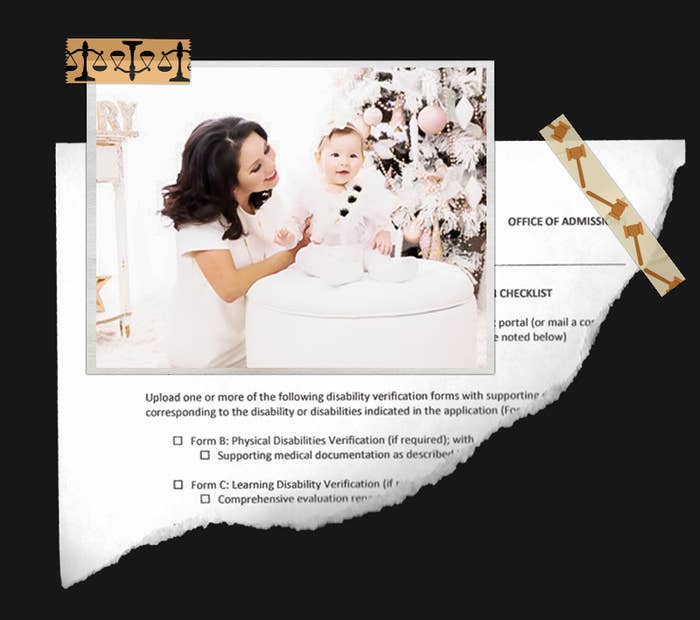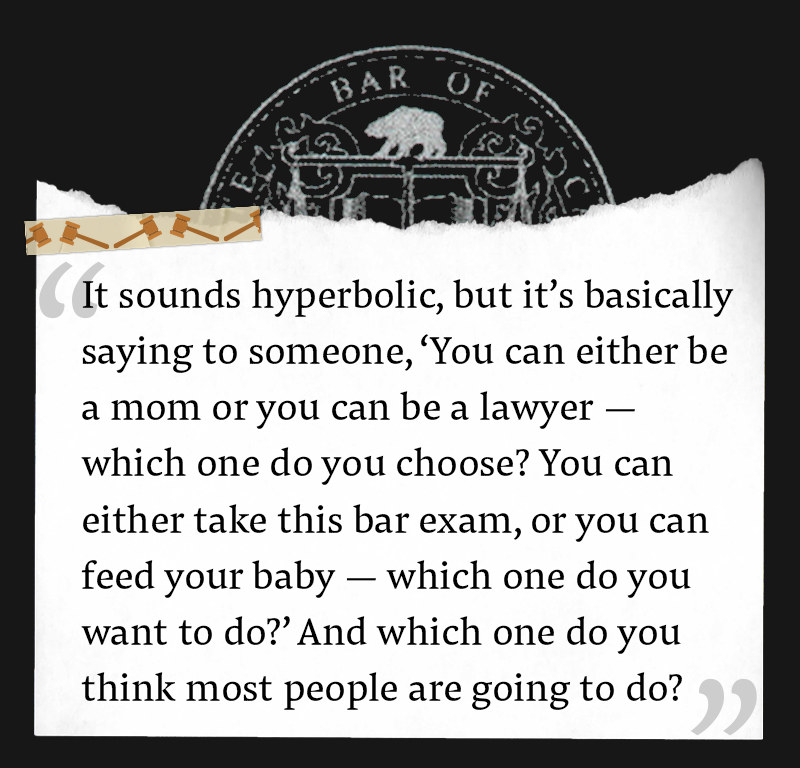When Estefania Parra Simmons took the California bar exam in February 2021, she was six months pregnant. She had recently graduated from law school and had studied hard, gritting her teeth through the severe pain that accompanied her growing baby bump, in order to pass the exam and become a licensed attorney.
Preparing for the bar can already be stressful enough — but in Parra’s case, sitting for the hourslong, two-day test was likely to be physically excruciating.
“Even by the time I was 40 minutes in, my back was killing me, and my baby was moving around like she was doing Zumba in there,” Parra, 37, told BuzzFeed News. “My ribs hurt so badly … [it] was torture.”
Unable to concentrate through the pain, Parra ran out of time, filling in “C” for the remaining multiple choice questions. When her results came in months later, she wasn’t surprised to have failed. “I knew in my heart I did not pass,” she said. “[It was] devastating on so many different levels.”
Parra had applied for pregnancy accommodations for the exam, requesting longer break times, but she was denied due to a missing supplemental form for physical disabilities, which she had not realized was needed. Instructions for requesting accommodations found on the California bar website state that “applicants with temporary medical conditions, such as a pregnancy or broken leg, and mothers who are nursing” may request accommodations, but does not specify that they are classifying these individuals as disabled — a confusing distinction as it deviates from the Americans With Disabilities Act, which covers pregnancy-related disabilities, but not pregnancy or lactation in and of themselves.
“I’m sorry, but I was 36 years old, and nowhere in my brain did it ever cross my mind that I would have to declare myself physically disabled while I was pregnant,” Parra said. “And there’s absolutely nothing on their website — I read the rules, the requirements for accommodations, everything, [and] there is nothing that says this is what you have to do.”
Now, Parra is preparing to retake the exam on Tuesday, but again, she will not be granted the longer breaks she requested to pump milk for her 1-year-old daughter. Her request was denied because a form she needed from her doctor wasn’t finalized until a day or two before the deadline, which coincided with the death of her 16-year-old dog.
Between the stress of studying, caring for her baby, and grieving her pet, she narrowly missed the deadline — her mistake, she acknowledges, but she was disheartened when administrators wouldn’t make an exception and flatly rejected her appeal.
Without the necessary accommodations, Parra is likely to once again suffer through physical pain during the exam. “My boobs are going to harden, they become like rocks,” she said. “And it really hurts — it’s like little needles being stuck into your boob.”
The bar is famously arduous, anxiety-provoking, and difficult to pass. Less than 40% of people passed the California exam in February 2021, the same test that Parra took. But for pregnant or nursing test takers like Parra, one of the biggest challenges can be accessing the accommodations they need for the two-day exam. The rules for accommodations, both in what is offered and how they are requested, vary widely by state — and even for meticulous future lawyers, the process can be perplexing and unforgiving. As a result, some across the US have their requests denied, putting them at a disadvantage for the exam that can hinder them in beginning their careers.
This is far from a brand-new issue. In 2014, an Illinois woman was initially denied extra time to pump, but after contacting the ACLU and speaking out in the media, administrators granted her the requested breaks. In October 2020, a pregnant woman, also in Illinois, was denied accommodations for the bar exam she would be taking just two weeks before her due date. She wound up going into labor during the first day of the exam, but continued, going to the hospital only after she was done. She gave birth the next day, after which she completed the rest of the exam from her hospital bed — and passed. And lawyers aren’t the only professionals who may find themselves held back by insufficient accommodations for exams; in 2007, a Massachusetts mother preparing for her medical licensing exam was not permitted extra break time for pumping. She sued, and five years later, a state court ruled in her favor.

“It’s very concerning that at this critical time, where women are seeking an entry point into their legal careers, that such barriers exist,” attorney Melinda Koster, who specializes in discrimination cases, told BuzzFeed News. “This can mean that women end up postponing taking the bar examination altogether, or they have to experience significant anxiety or pain while taking the bar.”
In a statement to BuzzFeed News, the State Bar of California’s Chief of Programs Donna Hershkowitz said they are reviewing their accommodations policies and recently held a forum to discuss issues that have arisen and how they might be addressed. “We look forward to working with former and current applicants as well as the disability rights community as we revise and reshape our process. That being said, unfortunately we are not in a position to comment on individual cases,” Hershkowitz said.
A breastfeeding mother taking the exam in another state this week, who asked to remain anonymous due to fears of harming future job prospects, told BuzzFeed News she also tried to apply for accommodations. She, too, was denied; her jurisdiction offers a space to pump and allows test takers to bring their equipment, but denied her request for additional breaks so she could pump as needed. Administrators said extra breaks would only be granted to applicants with disabilities covered by the ADA, which lactation is not.
“I was told I could just pump during my lunch break,” she said. “Right now, I feed my baby every two hours … so really, you’re looking at four hours between pumping.”
With no recourse, the mother has little choice but to accept the decision and get back to studying. She plans to pump in her car up until the moment she has to go inside for the exam, then pump in the car again during lunch. Days before the exam, she took a practice test, during which she “practiced” pumping according to the schedule the bar will force her to follow.
For lactating people, being told to “just pump during lunch” is insufficient to address their individual needs. The inflexible schedule of the bar can mean test takers are unable to express human milk as regularly as they need to, putting them at risk for health complications including painfully engorged breasts, a reduced milk supply, clogged ducts, or even mastitis, a bacterial infection that can become serious.
“Philosophically, people think breastfeeding is a choice,” attorney Fran Griesing told BuzzFeed News. “[But] it’s not something you can turn on and off easily … [or] say, ‘I’m not going to do it today.’ To say it’s a choice, whether to start in the first place or somehow not do it during the bar exam, is beyond ridiculous.”
And it’s even less of a “choice” than ever right now, due to the severe formula shortage that’s left parents across the US struggling to feed their babies.
Learning of future lawyers struggling to access pregnancy-related bar accommodations has felt particularly grim following the repeal of Roe v. Wade, Griesing said. And it’s not the only way she’s seen sex inequality in bar exam practices — it was just last year that the American Bar Association passed a resolution urging that examinees should be permitted to bring menstrual products, but many state bar examiners still don’t offer clear guidance. These policies can have an outsize impact not just on cisgender women, but also on trans and nonbinary people, for whom accommodations may be even harder to access and put them at risk of being involuntarily outed.
“To me, it’s sadly ironic … that the highest court in the land has made that decision,” Griesing said of the Supreme Court’s abortion ruling. “But the same profession that those justices come from and the leaders of that profession are making it harder and harder for women to become lawyers.”
MothersEsquire, an organization advocating for mothers in the legal field, has taken a leading role in pushing for those struggling to get pregnancy accommodations for the bar. Michelle Browning Coughlin, the group’s founder, told BuzzFeed News she typically hears from at least one person going through this each bar cycle. For the upcoming July bar, she has heard from three.
“There is such a contradiction around the fact that [bar administrators] are presumably interested in seeking justice, fairness, the kinds of things the law is supposed to stand for,” Coughlin said. “And yet here they are in a situation where their own ability to enter that profession is being hampered merely because they’re a breastfeeding mother.”
Many in the legal field argue that the denial of these accommodations is discriminatory, due to the disproportionate impact it can have on pregnant or nursing people. But the liminal status of most of these people — people who have completed law school, but don’t have jobs yet or haven’t begun their employment — means that federal laws that might have protected them do not apply during this period of limbo. As students, Title IX would forbid discrimination on the basis of sex, including being pregnant or a parent. Once employed, federal laws give people who lactate the right to express milk in the workplace and prohibit pregnancy-based discrimination.
In the absence of federal legislation that would unambiguously protect pregnant or breastfeeding bar examinees, Coughlin must advocate for every person who reaches out to MothersEsquire individually, familiarizing herself with the wildly varying policies of any of the 50 states.
But even in states where pregnancy-related accommodations can be accessed, such policies are often vaguely written and difficult to find, causing some applicants to be denied over minor errors or missing forms they never knew were needed.
Koster, the lawyer, told BuzzFeed News that women are spending time researching their rights, speaking to lawyers, and going through "extremely burdensome" appeals processes at a time when they should be studying instead.

“It sounds hyperbolic, but it’s basically saying to someone, ‘You can either be a mom or you can be a lawyer — which one do you choose? You can either take this bar exam, or you can feed your baby — which one do you want to do?’ And which one do you think most people are going to do?” Coughlin said.
And being denied these necessary accommodations can have long-lasting effects on test takers’ lives and finances, holding them back from beginning their legal careers.
“The lack of accommodations could very well mean that an exam taker who’s pumping will fail the bar, because the reality is, the break time that’s offered during the bar examination doesn’t necessarily align with when women need to pump,” Koster said.
The possibility of this outcome is all too familiar for Parra, who can only hope she is able to focus on the exam despite the pain she’s likely to experience. If she doesn’t pass this time, she does not plan to try again in February 2023 — it’s been deeply demoralizing, and she needs a break, she said.
Parra can’t help but cry when she considers what preparing for the bar has meant for her as a mother. Her husband has also been studying for it, so Parra’s mom has stepped in to help with much of the childcare.
“I’ve missed so many firsts of my daughter because I was studying for this exam. … She started walking in early June, and I missed it,” she said. “Studying for this exam literally makes me feel like a bad mother.” ●
